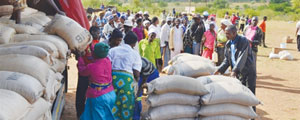
TIME is running out for government to fulfil the accelerated action plan for Millennium Development Goal (MDG) Number 2, which seeks to ensure all children in the country complete primary education by 2015, secretary for Education, Sport, Arts and Culture Constance Chigwamba has said.
Report by Phillip Chidavaenzi
Speaking at the launch of the 2012 MDGs Progress Report in Harare on Wednesday, Chigwamba said the shortage of food was a major drawback in Zimbabwe’s attempt to meet MDG 2. “Those ravaged by hunger cannot go to school and learn and succeed even if they get the best of teachers. In Zimbabwe, we have got some very good teachers, but if they are hungry, the children cannot learn and succeed in whatever they do,” she said. She also said illiterate women remained hungry hence would not be able to secure employment, a situation which had a spiral effect on their children. “Their children have high malnutrition. The mothers themselves don’t value pre-natal care leading to high maternal complications, high maternal morbidity ad high child mortality as well as high risk of HIV, high risk of Aids and other diseases,” Chigwamba said. She added that programmes such as the Basic Education Assistance Module (BEAM), School Feeding Programme and Second Chance Programme were all designed to enhance access to education for all. Deputy chief secretary to the President and Cabinet Ray Ndhlukula, however, said the country remained committed to meeting MDGs despite the challenges that had hampered implementation of some of the goals. Ndhlukula said Zimbabwe had prioritised goals 1, 3 and 6 which relate to eradication of poverty, promote gender equality and combat HIV and Aids and malaria among other diseases. “From this report we draw lessons in terms of those MDGs that we can accelerate with a reasonable chance for their attainment by 2015, similarly the report also highlights those MDGs where issues still remain outstanding,” he said. “While progress continues to be made in education and gender equity sectors, in terms of net enrolment and literacy rate as well as gender parity in both primary secondary schools, challenges still persist in poverty, maternal mortality, HIV and Aids although the HIV prevalent rate has steadily declined.” United Nations Development Programme resident co-ordinator in Zimbabwe Alain Noudehou said the report was a valuable instrument in “extracting evidence from the ground” and hailed progress made in the areas of primary education, HIV and Aids and gender. He, however, said despite the progress, there were still many challenges that needed to be tackled, particularly the issue of maternal mortality rate.











